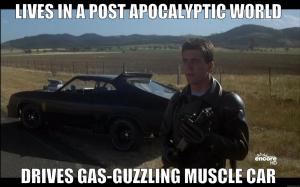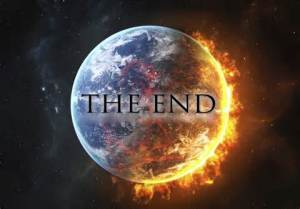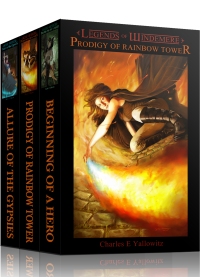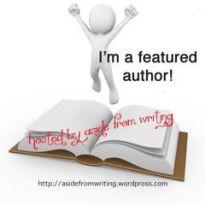I probably should have written this post earlier, but I was still thinking about it. I’ve been calling Crossing Bedlam a Rated-R post-apocalyptic action comedy thing or some combination of that for a while. Once or twice I’ve thought of it as a dystopia, which might not be a real word according to all spellcheckers. This is the opposite of a utopia in that it’s a fictional world that is a terrible place to live. I think Hunger Games, Mad Max, and Maze Runner count for this.
And that’s what I was thinking about really. It seems that one of the standards of this genre is that humanity sucks and falls back on primal urges once society collapses. Probably true for reality, but it never seems to recover even after years of things circling the drain. You rarely see a post-apocalyptic world where things are recovering or something new has appeared. Sure, you get a handful of protagonists who remain somewhat innocent and are trying to revive the human spirit. Maybe even free people from an oppressive dictator or whatever it is they’re doing in Maze Runner. Cure a disease through torture and death?
In Crossing Bedlam, I definitely had some of this in there, but I think I went a little too nice on humanity. Previous posts have mentioned that are groups who tried to keep some pieces of society going. Also, I thought that after ten years, some level of stability would be appearing in various regions. Don’t forget the fact that this is a world where post-apocalyptic fiction existed before the collapse. So people fell back on those sources to figure out what to do or what not to do. I think me retaining this genre’s existence within the world changed everything. It isn’t like a horror movie or a zombie show where those things never existed to give people an idea of what might happen. At least with fantasy, the internal stories about dragons and magic are current events instead of fiction.
This was actually one of the more difficult things about writing this book. Deciding how far into the crapper I sent the country would determine the dangers and help that the heroes would run into. If nothing recovered then there would be very few allies, especially those that would willing help. Too much recovery and it basically be a casual drive through abandoned ruins with a bored serial killer riding shotgun. Lloyd probably wouldn’t be bored for long. For the purpose of the story and my desire to have a lot of silly fun, I tried to find a decent middle ground. Some places are worse than others and not all background humans fall into either oppressed rabble or power-hungry dictator.
Now, I did try to think about why this genre seems to always be so bleak. Probably because that gives characters only one way to go if they survive and the audience will wonder if they could do the same. Yet, I do think it goes a little too far at times and touches on a sense of cynicism. Might not be the author exactly, but a feeling that the majority of mankind would crumble into anarchy and only a handful of people would keep their wits. Kind of wonder if it would be the opposite where those currently in power would freak out since their purpose no longer exists and the average person will find a way to survive anyway. Though recent history does show that humans suffer from a very big herd mentality when emotions run high. That’s why I have Cassidy mention the first year or two were a nightmare due to non-stop riots. Again, you don’t always see what happens when mankind regains their sanity and try to recover.
So, what are your thoughts on the dystopia genre and how humanity tends to be portrayed?







I think you have a good point, Charles.. most ordinary folks are only trying to survive within our privileged society as it is and would probably continue to do so. Probably with a little more desperation and clearer definition of their personal moral limits too.
LikeLike
And there would probably be more of a focus on the essentials. Don’t think rent, phone bills, and insurance would be big things after a societal collapse. Food, water, and just claiming a shelter would be the important stuff. Sad thing is that I’m sure there are places in the world actually like this.
LikeLike
There are…and often right on our civilised doorsteps…
LikeLike
Kind of makes you question the civilized part.
LikeLike
Doesn’t it just.
LikeLike
I used to read a lot of dystopian books–most young adult novels. But they all seemed like Hunger Games clones, since that series is so successful. I’d like to see the genre branch out more away from the usual dictatorship government runs the world while plucky teens engage in love triangles while fighting each other.
I agree that sometimes these books skew too far toward the everyone-is-selfish end of the spectrum. If that were really the case, everything would completely collapse.
LikeLike
Though I don’t think Hunger Games was really the first. The dystopia has been around for a while and everyone seems to root for the rebels. Almost sounded like I was talking about Star Wars there. Complete with the love triangle and plucky heroes. Guess it wasn’t really a dystopia though because those tend to be on Earth. I think the YA dystopia is dying off now that the Hunger Game movies are over, so we’ll see what comes next.
The oddest thing is that since writing this post, I’ve heard a lot of people say that they would immediately turn into a selfish survivor. Almost like there are those who are waiting for the chance to shed their humanity and indulge in their dark side.
LikeLike
I wasn’t trying to imply that Hunger Games was the first. After all, 1984 was written well before that. But the popularity of many YA dystopian novels and their deluge in the marketplace stems from the success of the Hunger Games. And there are still more coming out, thanks to The 5th Wave, Red Rising, and other books of that ilk. Or there have been zombies and fenced cities books ala The Forest of Hands and Teeth, Rot & Ruin, etc., which is another form of dystopia.
LikeLike
Seems YA thrives off trends. Prior to dystopia, you had vampires and it was wizards before that. Not sure what came before Harry Potter though. It really does show that one series will take off and you’ll get a saturation that inevitably burns the topic out. Except for zombies. They just won’t die, which is oddly appropriate.
I’ve actually never read 1984, so I’m leery of using it as an example. Known too many people who would scream ‘1984!’ and ‘Big Brother!’ without explaining what they meant. Actually, can you explain the dystopian part of it?
LikeLike
The setting is London in Oceania after a world wide war. Everything is divided into superstates. The government is a dictatorship, War still goes on. So that’s the dystopian aspect. Some governments have crumbled to conquerors.
LikeLike
I can see how people think we’re heading that way.
LikeLike
I see the fractured world being organized into groups. By the nature of a challenged infrastructure, the groups are smaller and more self-centered. Communications are back to the face to face level, and so large congregations of people lead to the riots you mention. The survivors learned early to put trust in those you personally know and pretty much forsake others. Leaders have found a way to appeal to the smaller groups and form tribal alliances which benefit all. I think the evolution of city-states would take many decades.
LikeLike
Humans do have a lot of features of pack animals. Communication is an interesting issue. I could see the Pony Express making a comeback. It’s interesting to think of how civilization would return after time has passed.
LikeLiked by 1 person
You would think some smart guy would set up the internet again.
LikeLike
I touch on that in ‘Crossing Bedlam’. It would probably be very limited.
LikeLiked by 1 person
“You have mail!”
LikeLike
Even after the social collapse, people will still get spam and messages from Nigerian Princes.
LikeLiked by 1 person
So true.
LikeLike
I think that after all the shit, there will be a return of sorts to what was before it is humans after all, and they do tend to stick to familiar things, so probably they will never learn.
LikeLike
(Sorry for the delayed response. Power outage for most of the day.)
I wonder about that. Humans as a species never seem to learn, but many individuals do. It might depend on the ones that take leadership. If those who caused the mess are killed in the early years then there could be a higher chance of us avoiding the same pitfalls.
LikeLiked by 1 person
sounds good to me
LikeLike
I would observe that in some ways dystopian storytelling is a developmental phase for youth. Calling it a phase makes it sound trivial, but really I think the process is important. As kids, most of us view our families and the world as safe places with benevolent rulers in the form of our parents. A utopia, if you will. However, as we move into our teens, we begin to see flaws in our parents and the world. We question, demand, bicker, depending on family dynamics.
Dystopian fiction reflects this process of questioning as children move toward adulthood. Although the dystopian story setting is often bleak, in fact the youth usually ‘solve’ many issues. So, though questioning the values of their world, they also accept responsibility for changing what they don’t like.
LikeLike
Interesting interpretation. I can see how phase might be an iffy term, but it does ring true. I think too often we use the word to trivialize something. Yet every living thing goes through phases over the course of its existence, so it does work surprisingly well for what you’re saying. I noticed you talk about dystopian fiction for teens. It does seem to be where the genre has landed, but I keep thinking about Brave New World and 1984. Those are more adult, so do you think the genre has shifted to a younger demographic?
LikeLiked by 1 person
In the era of the books you mention, there was little or no writing specifically directed to children. That’s more of a modern marketing phenomenon. But I do think young readers have really claimed dystopian fiction as their own.
Although there’s some overlap, more overtly horrific material, such as zombies and conspiracy theories, are more the domain of adults because those are adult fears.
LikeLike
Does seem like adults never step up to overthrow the dystopian overlords without a teenager in the lead.
LikeLiked by 1 person